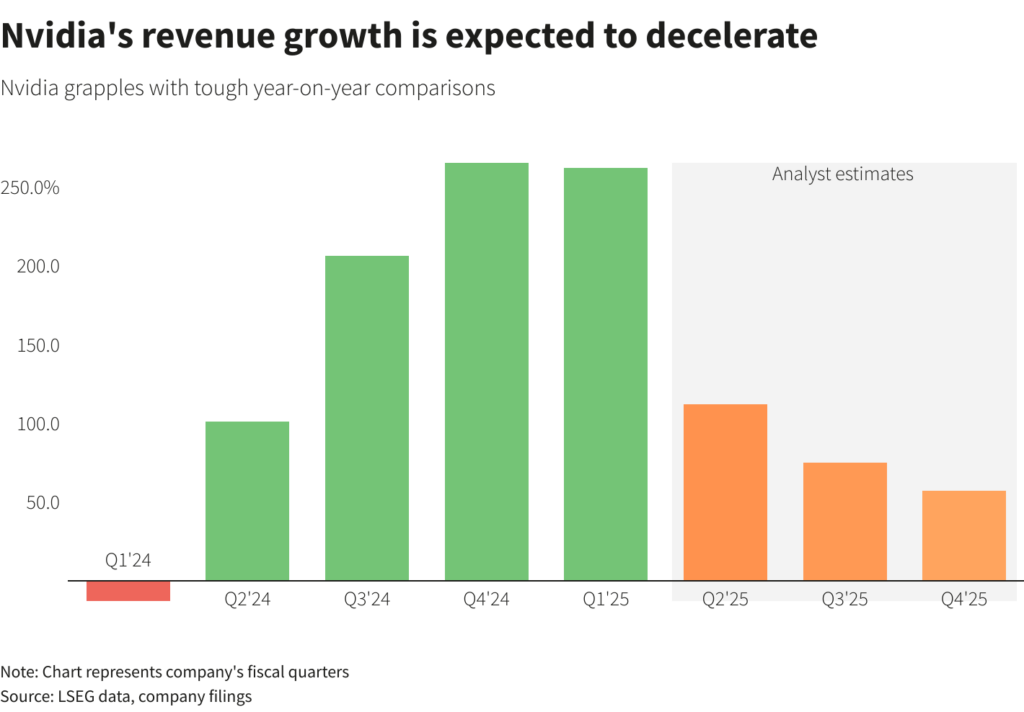Nvidia’s Q2 AI chip revenue is expected to double, but investors may demand even more
A day after Nvidia reports earnings for the May-July period, an AI rally could be stoked or broken by a beat or a failure on Thursday based on Wall Street expectations.
This year, the company’s shares have increased by over 150%, resulting in a $1.82 trillion increase in market value and propelling the S&P 500 to new highs.
The stock is valued at approximately 37 times its forward earnings, higher than the average of 29 for the top six technology companies on the benchmark index, including the chipmaker.

Technology giants, such as Microsoft, have been purchasing Nvidia’s powerful graphic processing units, which enable the rapid processing of large amounts of data. Microsoft is currently investing significantly in the development of its AI infrastructure. The current state of data centers presents a challenge in replacing these processors, significantly increasing Nvidia’s valuation.
According to LSEG data as of Aug. 23, Nvidia is anticipated to have achieved a year-over-year increase in second-quarter revenue of approximately 112% to $28.68 billion.
However, the cost of a production ramp-up to meet the increasing demand likely resulted in a decline of over 3 percentage points to 75.8% from the first quarter.
Daniel Morgan, senior portfolio manager at Synovus Trust, which holds shares in major U.S. technology companies, including Nvidia, stated, “They are not only a benchmark for chips, but they are also a benchmark for AI as a whole.”
“If Nvidia misses, (investors are) going to sell off every company in AI.”
Certain investors are apprehensive about Nvidia’s capacity to satisfy excessive expectations and have expressed doubts regarding the extent to which its largest clients are investing in AI.
These concerns resulted in a 20% decline in Nvidia’s stock during most of July and early August. However, a recent rebound has left the stock at a mere 5% below its June record high.

The potential production delays of Nvidia’s next-generation Blackwell AI processors may be the source of additional complications. CEO Jensen Huang declared that the processors would be delivered during the second quarter in May. However, analysts have identified design challenges that could delay the delivery date.
This suggests that revenue growth may be diminished in the initial half of the following year, according to the research group SemiAnalysis. It is also possible that margins could be reduced if TSMC, Nvidia’s semiconductor contractor, increases fees, a possibility that the Taiwanese company recently suggested.
Nvidia is anticipated to forecast a 75% increase in third-quarter revenue to $31.69 billion, according to LSEG data. This will conclude its five-quarter run of triple-digit growth and reflect the challenging comparisons from a year ago when it experienced a 206% increase to $18.12 billion.
Nvidia’s growth has exceeded 200% for the previous three quarters.
Michael Schulman, chief investment officer at Running Point Capital, stated, “We are approaching the law of large numbers here; once a company reaches a certain size, it is physically unable to maintain the same growth rate.”

According to certain analysts, Nvidia could mitigate the impact of the Blackwell chip delay by substituting the orders with the Hopper processors from the previous generation. The Hopper family of processors is not as potent or profitable as Blackwell; however, it is adequate for most AI-related applications.
Investors will also inquire about the latest developments regarding AI processors for the Chinese market, as the U.S. government has prohibited the sale of its most advanced circuits.
In a significant market where Huawei has emerged as a competitor, Nvidia’s processors, reportedly referred to as H20 and less powerful than its most advanced CPUs, could potentially assist the company in acquiring new business in the coming quarters.
Additionally, there are increasing antitrust concerns regarding the organization’s operations. US regulators are investigating whether Nvidia is attempting to bundle its networking equipment with its highly sought-after AI processors or if it has pressured cloud providers to purchase multiple products.



